- Home
- W. Somerset Maugham
Cosmopolitans
Cosmopolitans Read online
W. Somerset Maugham
COSMOPOLITANS
THE SUN DIAL PRESS, INC.
NEW YORK 1938
PRINTED AT THE Country Life Press, GARDEN CITY, N. Y., U. S. A.
COPYRIGHT, 1923, 1924, 1925, 1926, 1927, 1928, 1929, 1936
BY W. SOMERSET MAUGHAM
ALL RIGHTS RESERVED
CL
PREFACE
THE LITTLE STORIES in this volume were written on commission. The first was written in 1923; the last, I think, in 1929. When I was in China, meaning to write an account of my journey, I took notes of whatever I saw that excited my interest; but when I came home and read them it seemed to me that they had a vividness that I might easily lose if I tried to elaborate them into a connected narrative. So I changed my mind and decided to publish them as they stood under the title: On a Chinese Screen. Ray Long, who was then editor of the Cosmopolitan Magazine, chanced to read this and it occurred to him that some of my notes might very well be taken for short stories. If you are a story-teller any curious person you meet has a way of suggesting a story, and incidents that to others will seem quite haphazard have a way of presenting themselves to you with the pattern your natural instinct has imposed on them.
Magazine readers do not like starting a story and after reading for a while being told to turn to page a hundred and something. Writers do not like it either, for they think the interruption disturbs the reader and they have an uneasy fear that sometimes he will not take the trouble and so may leave their story unfinished. There is no help for it. Everyone should know that a magazine costs more to produce than it is sold for and could not exist but for the advertisements. The advertisers think that their announcements are more likely to be read if they are on the same page as matter which they modestly, but often mistakenly, think of greater interest. So in the illustrated periodicals it has been found advisable to put the beginning of a story or an article, with the picture that purports to illustrate it, at the beginning and the continuation with the advertisements later on.
Neither readers nor writers should complain. Readers get something for less than cost price, and writers are paid sums for their productions which only the advertisements render possible. They should remember that they are there as baits. Their office is to fill blank spaces and indirectly induce their readers to buy motor accessories, bust bodices and join correspondence courses. Fortunately this need not affect them. The best story from the advertisers’ standpoint (and they make their views felt on this question) is the story that gives readers most delight. Ray Long conceived the notion that the readers of the Cosmopolitan would like it if they were given at least one story that they could read without having to hunt for the continuation among the advertisements and he commissioned me to write half a dozen sketches of the same sort as those in On a Chinese Screen. They were to be short enough to print on opposite pages of the magazine and leave plenty of room for illustration.
The sketches I wrote pleased and the commission was renewed. I went on writing them till my natural verbosity got the better of me and I found myself no longer able to keep my stories within the limits imposed upon me. Then I had to stop.
But I think I learned a good deal from the writing of them and I am glad that I wrote them. My difficulty was to compress what I had to tell into a number of words which must not be exceeded and yet leave the reader with the impression that I had told all there was to tell. It was this that made the enterprise amusing. It was also salutary. I could not afford to waste a word. I had to be succinct. I was surprised to find how many adverbs and adjectives I could leave out without any harm to the matter or the manner. One often writes needless words because they give the phrase a better ring. It was very good practice to try to get balance into a sentence without using a word that was not necessary to the sense.
The matter of course had to be chosen with discretion; it would have been futile to take a theme that demanded elaborate development; and I have a natural predilection for completeness, so that even in the little space at my disposal I wanted my story to have a beginning, a middle and an end. I do not for my own part much care for the shapeless story. To my mind it is not enough when the writer gives you the plain facts seen through his own eye (which means of course that they are not plain facts, but facts distorted by his own idiosyncrasy); I think he should impose upon them a design. Naturally these stories are anecdotes. If stories are interesting and well told they are none the worse for that. The story of the Good Samaritan is an anecdote and a very good one. The anecdote is the basis of fiction. The restlessness of writers forces upon fiction from time to time forms that are foreign to it, but when it has been oppressed for a period by obscurity, propaganda or affectation, it reverts, and returns inevitably to the anecdote.
The University of Columbia a little while ago very kindly sent me a little book entitled Modern Fiction written by two of its professors. I read it with interest and edification. It offers the best guide I have ever met across the fogbound swamps, shining mountains, pleasant oases and dreary deserts of Mr Joyce’s Ulysses. It treats of no book that it does not make one wish to read again. It is tolerant, perspicacious and stimulating. But there is one thing about it that very much surprised me. The books of which it treats are discussed in the most improving way. Their technique is acutely analyzed. Their value as psychological, sociological or ethical documents is estimated. But I can find nowhere a reference to their entertainment. So far as I can make out these two professors in all the years during which they have taught the ardent young who attended their lectures never even hinted to them that a novel should be read for fun. The novel may stimulate you to think. It may satisfy your esthetic sense. It may arouse your moral emotions. But if it does not entertain you it is a bad novel. It is merely laziness that induces people to go to novels for instruction on subjects that are the province of experts. There is no short road to knowledge and you will only waste your time if you seek it in a work of fiction. If you are interested in psychology, you had much better read a book on the subject. If you are interested in sociology you had much better go to a sociologist. The technical devices that an author uses to capture your interest are his own affair. Such a one as the “stream of thought” is an amusing trick, but it is of no more real importance than the epistolary style which was in vogue during the eighteenth century. Like that, it is an ingenious expedient to give verisimilitude. To suppose that it can have a scientific value, as some critics have done, is ridiculous. The novelist deals with individual cases which he has chosen to suit his purpose. They may exemplify a rule; they cannot serve to formulate one. The novelist gives you his private view of the universe. He offers you intelligent entertainment; and the first thing you should ask of an entertainment is that it should entertain.
I hope the reader will not think it presumptuous on my part to have touched on these matters of theory in a preface written to introduce a little collection of very short stories. I wish merely to warn him that I ask nothing from him but that he should find them amusing. I think it would be very tiresome to read them at a sitting, but I have a hope that if he reads one or two now and then when he has nothing better to do, he will take the same pleasure in them that was taken by the readers of the Cosmopolitan Magazine when they appeared once every month or so in its pages.
CONTENTS
Preface P. v
Raw Material P. 1
Mayhew P. 7
German Harry P. 13
The Happy Man P. 19
The Dream P. 26
In a Strange Land P. 34
The Luncheon P. 42
Salvatore P. 50
Home P. 58
Mr Know-All P. 66
The Escape P. 77
A Friend in Need P. 84
The Portrait of a Gentleman P. 92
The End of the Flight P. 102
The Judgement Seat P. 112
The Ant and the Grasshopper P. 120
French Joe P. 127
The Man with the Scar P. 135
The Poet P. 142
Louise P. 150
The Closed Shop P. 161
The Promise P. 176
A String of Beads P. 187
The Bum P. 198
Straight Flush P. 211
The Verger P. 221
The Wash Tub P. 234
The Social Sense P. 248
The Four Dutchmen P. 261
COSMOPOLITANS
RAW MATERIAL
I HAVE LONG HAD in mind a novel in which a card-sharper was the principal character; and, going up and down the world, I have kept my eyes open for members of this profession. Because the idea is prevalent that it is a slightly dishonourable one the persons who follow it do not openly acknowledge the fact. Their reticence is such that it is often not till you have become quite closely acquainted with them, or even have played cards with them two or three times, that you discover in what fashion they earn their living. But even then they have a disinclination to enlarge upon the mysteries of their craft. They have a weakness for passing themselves off for cavalrymen, commercial agents, or landed proprietors. This snobbish attitude makes them the most difficult class in the world for the novelist to study. It has been my good fortune to meet a number of these gentlemen, and though I have found them affable, obliging, and debonair, I have no sooner hinted, however discreetly, at my curiosity (after all purely professional) in the technique of their calling than they have grown shy and uncommunicative. An airy reference on my part to stacking the cards has made them assume immediately the appearance of a clam. I am not easily discouraged, and learning by experience that I could hope for no good results from a direct method, I have adopted the oblique. I have been childlike with them and bland. I have found that they gave me their attention and even their sympathy. Though they confessed honestly that they had never read a word I had written they were interested by the fact that I was a writer. I suppose they felt obscurely that I too followed a calling that the Philistine regarded without indulgence. But I have been forced to gather my facts by a bold surmise. It has needed patience and industry.
It may be imagined with what enthusiasm I made the acquaintance a little while ago of two gentlemen who seemed likely to add appreciably to my small store of information. I was travelling from Haiphong on a French liner going East, and they joined the ship at Hong-Kong. They had gone there for the races and were now on their way back to Shanghai. I was going there too, and thence to Peking. I soon learned that they had come from New York for a trip, were bound for Peking also, and by a happy coincidence meant to return to America in the ship in which I had myself booked a passage. I was naturally attracted to them, for they were pleasant fellows, but it was not till a fellow-passenger warned me that they were professional gamblers that I settled down to complete enjoyment of their acquaintance. I had no hope that they would ever discuss with frankness their interesting occupation, but I expected from a hint here, from a casual remark there, to learn some very useful things.
One-Campbell was his name-was a man in the late thirties, small, but so well built as not to look short, slender, with large, melancholy eyes and beautiful hands. But for a premature baldness he would have been more than commonly good-looking. He was neatly dressed. He spoke slowly, in a low voice, and his movements were deliberate. The other was made on another pattern. He was a big, burly man with a red face and crisp black hair, of powerful appearance, strong in the arm and pugnacious. His name was Peterson.
The merits of the combination were obvious. The elegant, exquisite Campbell had the subtle brain, the knowledge of character, and the deft hands; but the hazards of the card-sharper’s life are many, and when it came to a scrap Peterson’s ready fist must often have proved invaluable. I do not know how it spread through the ship so quickly that a blow of Peterson’s would stretch any man out. But during the short voyage from Hong-Kong to Shanghai they never even suggested a game of cards. Perhaps they had done well during the race-week and felt entitled to a holiday. They were certainly enjoying the advantages of not living for the time in a dry country and I do not think I do them an injustice if I say that for the most part they were far from sober. Each one talked little of himself but willingly of the other. Campbell informed me that Peterson was one of the most distinguished mining engineers in New York and Peterson assured me that Campbell was an eminent banker. He said that his wealth was fabulous. And who was I not to accept ingenuously all that was told me? But I thought it negligent of Campbell not to wear jewellery of a more expensive character. It seemed to me that to use a silver cigarette case was rather careless.
I stayed but a day in Shanghai, and though I met the pair again in Peking I was then so much engaged that I saw little of them. I thought it a little odd that Campbell should spend his entire time in the hotel. I do not think he even went to see the Temple of Heaven. But I could quite understand that from his point of view Peking was unsatisfactory and I was not surprised when the pair returned to Shanghai, where, I knew, the wealthy merchants played for big money. I met them again in the ship that was to take us across the Pacific and I could not but sympathize with my friends when I saw that the passengers were little inclined to gamble. There were no rich people among them. It was a dull crowd. Campbell indeed suggested a game of poker, but no one would play more than twenty-dollar table stakes, and Peterson, evidently not thinking it worth while, would not join. Although we played afternoon and evening through the journey he sat down with us only on the last day. I suppose he thought he might just as well make his bar chits, and this he did very satisfactorily in a single sitting. But Campbell evidently loved the game for itself. Of course it is only if you have a passion for the business by which you earn your living that you can make a success of it. The stakes were nothing to him and he played all day and every day. It fascinated me to see the way in which he dealt the cards, very slowly, with his delicate hands. His eyes seemed to bore through the back of each one. He drank heavily, but remained quiet and self-controlled. His face was expressionless. I judged him to be a perfect card-player and I wished that I could see him at work. It increased my esteem for him to see that he could take what was only a relaxation so seriously.
I parted with the pair at Victoria and concluded that I should never see them again. I set about sorting my impressions and made notes of the various points that I thought would prove useful.
When I arrived in New York I found an invitation to luncheon at the Ritz with an old friend of mine. When I went she said to me:
“It’s quite a small party. A man is coming whom I think you’ll like. He’s a prominent banker; he’s bringing a friend with him.”
The words were hardly out of her mouth when I saw coming up to us Campbell and Peterson. The truth flashed across me: Campbell really was an opulent banker; Peterson really was a distinguished engineer; they were not card-sharpers at all. I flatter myself I kept my face, but as I blandly shook hands with them I muttered under my breath furiously:
“Impostors!”
MAYHEW
THE LIVES OF MOST MEN are determined by their environment. They accept the circumstances amid which fate has thrown them not only with resignation but even with good will. They are like streetcars running contentedly on their rails and they despise the sprightly flivver that dashes in and out of the traffic and speeds so jauntily across the open country. I respect them; they are good citizens, good husbands, and good fathers, and of course somebody has to pay the taxes; but I do not find them exciting. I am fascinated by the men, few enough in all conscience, who take life in their own hands and seem to mould it to their own liking. It may be that we have no such thing as free will, but at all events we have the illusion of it. At a crossroad it does seem to us that we might go either to the right or to the left, and t
he choice once made, Tt is difficult to see that the whole course of the world’s history obliged us to take the turning we did.
I never met a more interesting man than Mayhew. He was a lawyer in Detroit. He was an able and a successful one. By the time he was thirty-five he had a large and a lucrative practice, he had amassed a
competence, and he stood on the threshold of a distinguished career. He had an acute brain, an attractive personality, and uprightness. There was no reason why he should not become, financially or politically, a power in the land. One evening he was sitting in his club with a group of friends and they were perhaps a little the worse (or the better) for liquor. One of them had recently come from Italy and he told them of a house he had seen at Capri, a house on the hill, overlooking the Bay of Naples, with a large and shady garden. He described to them the beauty of the most beautiful island in the Mediterranean.
“It sounds fine,” said Mayhew. “Is that house for sale?”
“Everything is for sale in Italy.”
“Let’s send ’em a cable and make an offer for it.”
“What in heaven’s name would you do with a house in Capri?”
“Live in it,” said Mayhew.
He sent for a cable form, wrote it out, and dispatched it. In a few hours the reply came back. The offer was accepted.

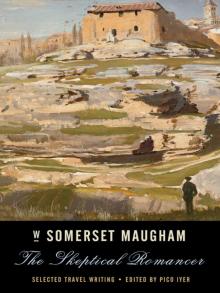 The Skeptical Romancer: Selected Travel Writing
The Skeptical Romancer: Selected Travel Writing The Summing Up
The Summing Up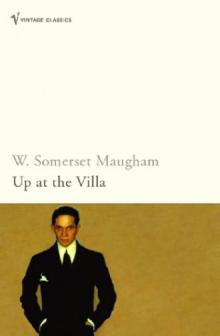 Up at the Villa
Up at the Villa The Razor's Edge
The Razor's Edge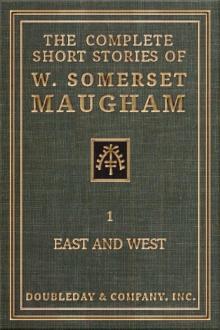 The Complete Short Stories of W. Somerset Maugham: East and West (Vol. 1 of 2))
The Complete Short Stories of W. Somerset Maugham: East and West (Vol. 1 of 2))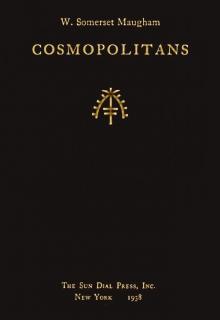 Cosmopolitans
Cosmopolitans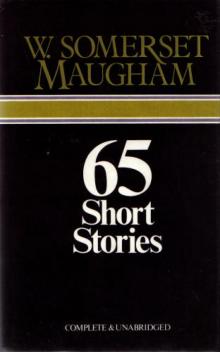 65 Short Stories
65 Short Stories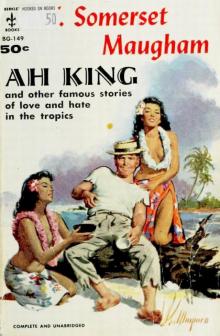 Ah King (Works of W. Somerset Maugham)
Ah King (Works of W. Somerset Maugham)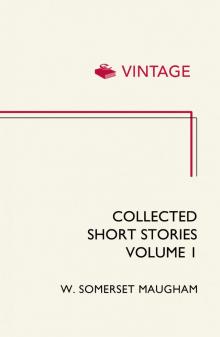 Collected Short Stories: Volume 1
Collected Short Stories: Volume 1 Collected Short Stories Volume 2
Collected Short Stories Volume 2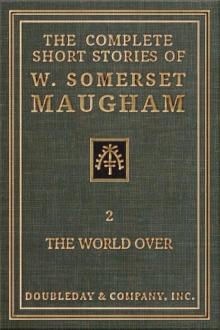 The Complete Short Stories of W. Somerset Maugham - II - The World Over
The Complete Short Stories of W. Somerset Maugham - II - The World Over Collected Short Stories Volume 4
Collected Short Stories Volume 4 Theatre
Theatre Short Stories
Short Stories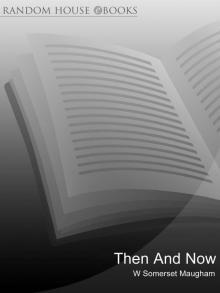 Then and Now
Then and Now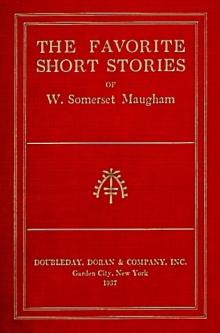 The Favorite Short Stories of W. Somerset Maugham
The Favorite Short Stories of W. Somerset Maugham Of Human Bondage
Of Human Bondage The Magician
The Magician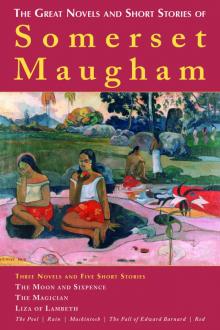 The Great Exotic Novels and Short Stories of Somerset Maugham
The Great Exotic Novels and Short Stories of Somerset Maugham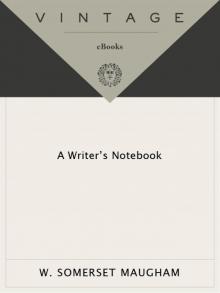 A Writer's Notebook
A Writer's Notebook Christmas Holiday
Christmas Holiday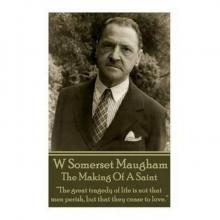 The Making of a Saint
The Making of a Saint Merry Go Round
Merry Go Round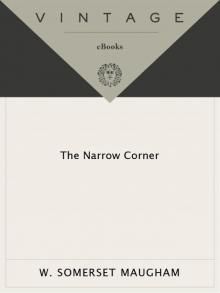 The Narrow Corner
The Narrow Corner Collected Short Stories Volume 3
Collected Short Stories Volume 3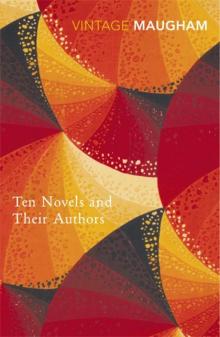 Ten Novels and Their Authors
Ten Novels and Their Authors Ashenden
Ashenden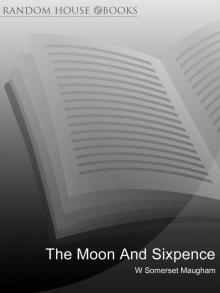 The Moon and Sixpence
The Moon and Sixpence Cakes and Ale
Cakes and Ale Liza of Lambeth
Liza of Lambeth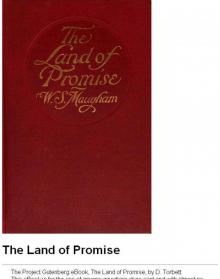 The Land of Promise: A Comedy in Four Acts (1922)
The Land of Promise: A Comedy in Four Acts (1922)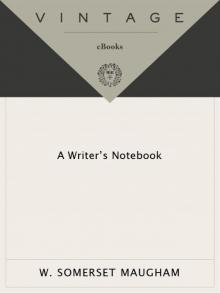 A Writer's Notebook (Vintage International)
A Writer's Notebook (Vintage International)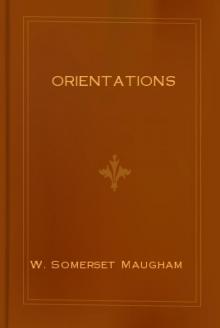 Orientations
Orientations Selected Masterpieces
Selected Masterpieces Mrs Craddock
Mrs Craddock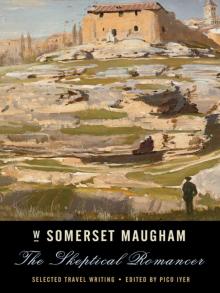 The Skeptical Romancer
The Skeptical Romancer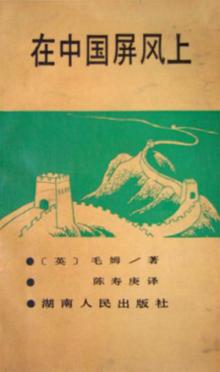 On a Chinese Screen
On a Chinese Screen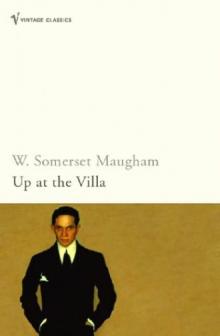 (1941) Up at the Villa
(1941) Up at the Villa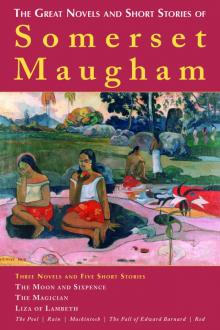 The Great Novels and Short Stories of Somerset Maugham
The Great Novels and Short Stories of Somerset Maugham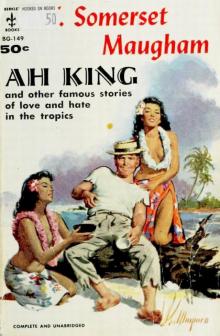 Ah King
Ah King The Explorer
The Explorer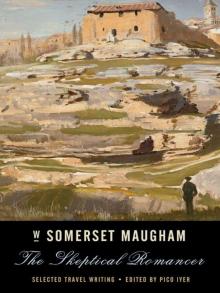 The Skeptical Romancer: Selected Travel Writing (Vintage Departures)
The Skeptical Romancer: Selected Travel Writing (Vintage Departures)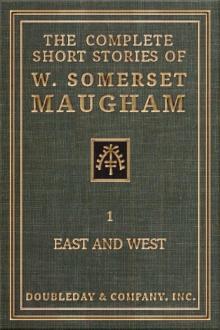 The Complete Short Stories of W. Somerset Maugham - I - East and West
The Complete Short Stories of W. Somerset Maugham - I - East and West